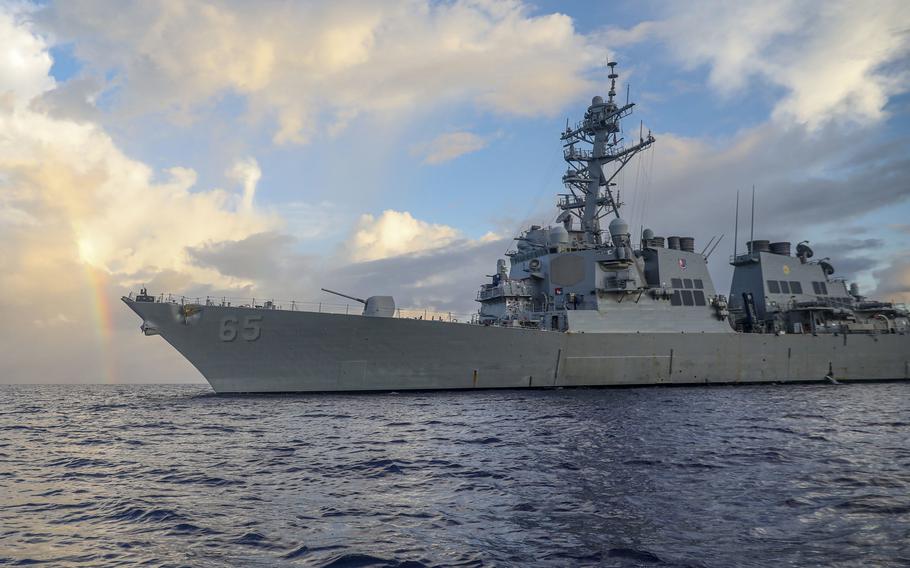
The guided-missile destroyer USS Benfold, seen here in the Philippine Sea, steamed through the Taiwan Strait, Tuesday, July 19, 2022. (Arthur Rosen/U.S. Navy)
The United States’ “One China” policy has “outlived its usefulness,” former Defense Secretary Mark Esper said Tuesday in Taipei hours before another U.S. warship passed through the Taiwan Strait.
Leading a delegation from the Washington, D.C.-based think tank Atlantic Council, Esper met with Taiwanese President Ing-Wen Tsai on Tuesday. He called China the “greatest challenge facing the democracies of the West” and said he personally believed it was time to “move away from strategic ambiguity.”
“The mere existence of a thriving democracy with a robust economy and a freedom-loving people is anathema to everything the Chinese Communist Party believes,” Esper said. “That is why that, in this era, it is important that the democracies of the West stand up and defend thriving democracies such as Taiwan against the bullying of your neighbor to the west.”
President Joe Biden during a visit to Japan in May said the U.S. would help defend Taiwan militarily from an attack by China, a statement many interpreted as an end to “strategic ambiguity,” the notion of an unpredictable U.S. response.
Beijing considers Taiwan a breakaway province that must be reunited with the mainland, by force if necessary. Under the “One China” policy, the U.S. acknowledges Beijing’s view that it has sovereignty over Taiwan, which split from the mainland in 1949, but considers Taiwan’s status unsettled.
“If there's one issue that unites politicians in Washington, D.C., it is the view that China is a strategic challenge for our country, and that Taiwan is a good friend that we must support and defend,” Esper said.
China responded to Esper’s comments the same day. Beijing “firmly opposes” any attempt to “play the ‘Taiwan Card’” or interfere with China’s “internal affairs,” Foreign Ministry spokesman Lijian Zhao said at a media briefing.
“The One China principle is the political foundation of China-US relations and an established international consensus,” Zhao said.
Also Tuesday, the guided-missile destroyer USS Benfold made a trip through the Taiwan Strait, which separates Taiwan from mainland China. The Benfold steamed south to north through the 110-mile-wide waterway and entered the East China Sea around 11 p.m. Tuesday, U.S. 7th Fleet spokesman Lt. Nicholas Lingo told Stars and Stripes by email Wednesday.
The routine transit was not a response to any event, Lingo said.
“The ship’s transit through the Taiwan Strait demonstrates the United States’ commitment to a free and open Indo-Pacific,” 7th Fleet said in a Tuesday news release. “The United States military flies, sails, and operates anywhere international law allows.”
The Navy has sent a warship through the strait six times so far this year and roughly once a month over the past two years. Beijing typically condemns the trips but had said nothing about the Benfold as of Wednesday afternoon.
In May, the guided-missile cruiser USS Port Royal made a similar trip, the first by a U.S. cruiser in two years. The Benfold last passed through the strait on July 28, 2021.
The Benfold made two demonstrations in the South China Sea prior to passing through the Taiwan Strait. It steamed past the Paracel Islands, about 200 miles south of Hainan, China, on July 13. Three days later it passed near the Spratly Islands, a cluster of islands 500 miles south of the Paracels.
Both island chains are claimed in full by China, Taiwan and Vietnam, and the freedom-of-navigation operations were meant to challenge “unlawful restrictions” imposed by the three countries, according to 7th Fleet.